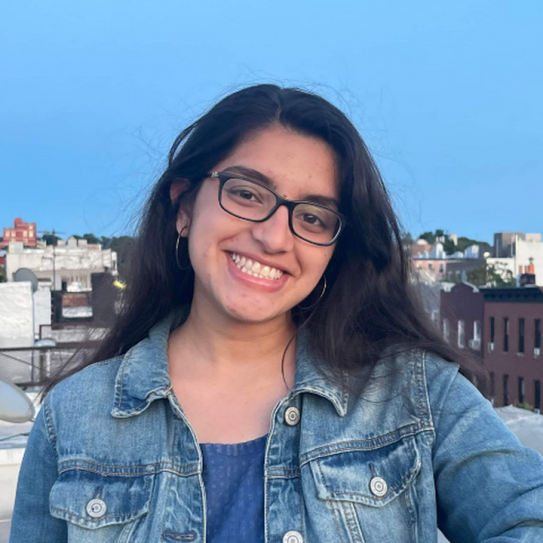
UN Sustainability Goals
- Good Health And Well-Being
Areas of Excellence
- Health
Global Challenge: Access to Healthcare
Abstract
Following the emergence of the COVID-19 pandemic, I was taken aback by the lack of resources available to deal with such a large global health crisis. I quickly became interested in how I can be a part of the initiative to improve access to healthcare resources. In 2022, I joined the Bioengineering Lab at NYU Tandon, and got the chance to develop a sensor to increase detection of life-threatening COVID-related symptoms. Here, I describe this work and its impact on the global healthcare system–
A digital nanoplasmonic microarray immunosensor for multiplexed cytokine monitoring during CAR T-cell therapy from a leukemia tumor microenvironment model”:
During an immune response, such as one elicited by COVID-19, the body releases multiple factors to regulate immunological responses. One such biological factor is a cytokine, a small protein which is produced by immune cells, such as T-cells. In certain cases, the body will elicit a ‘cytokine storm’, in which pro-inflammatory cytokines are released in excess, causing overactivation of the immune system and systemic inflammation. This dangerous reaction may occur in response to chimeric antigen receptor (CAR) T-cell therapy. To monitor the occurrence of such cytokine-related processes, an immunosensor integrated with a microfluidic biomimetic Leukemia-on-a-Chip model was developed to monitor the release of six cytokines (TNF-α, IFN-γ, MCP-1, GM-CSF, IL-1β, and IL-6). The nanoplasmonic biosensors demonstrated precise multiplexed measurements with low sample volume, rapid assay time, heightened sensitivity, and minimal sensor crosstalk. Results unveiled a heterogeneous cytokine secretion profile, highlighting a correlation between cytokine release and CAR T-cell cytotoxic activity.
This study aligns with the United Nations Sustainable Development Goal 3 (Good Health and Well-being), which aims to ensure healthy lives and promote well-being for patients around the world. By improving our understanding of immune responses during cancer treatment, we can work towards developing better and safer immunotherapies, ultimately contributing to better, cheaper, and more accessible health outcomes for patients.
Bio:
Saee Patwardhan was born in Bombay, India and grew up in Louisville, Kentucky! She came to Brooklyn to pursue her Bachelor's degree in Biomolecular Science. She is a member of the BS/MS program, in which she is getting a joint Master's degree in Biotechnology. Over the summer of 2022, Saee participated in the Undergraduate Summer Research Program at NYU Tandon. Working in Dr. Weiqiang Chen's bioengineering lab, she helped fabricate a biosensing chip for advanced cytokine detection and application to CAR T-cell therapy. Following this, she joined Dr. Yi Ye's lab at NYU's College of Dentistry where she performed a literature review regarding the pain mechanisms of oral cancer and their connection to the peripheral nervous system. After college, Saee would like to continue her work in an industry research lab, primarily in the fields of immunology, oncology, and genetics! Currently, she works with the Tandon Career Hub and the Department of Chemical and Biomolecular Engineering to help design events and resources to improve professional development.
The Global Challenge that interests her most is access to healthcare. What has become apparent to me, especially throughout the COVID-19 pandemic, is that quality healthcare is not accessible to a vast majority of people. Saee hopes to tackle this challenge through research that can bring about drugs and treatments that are more affordable and effective.

